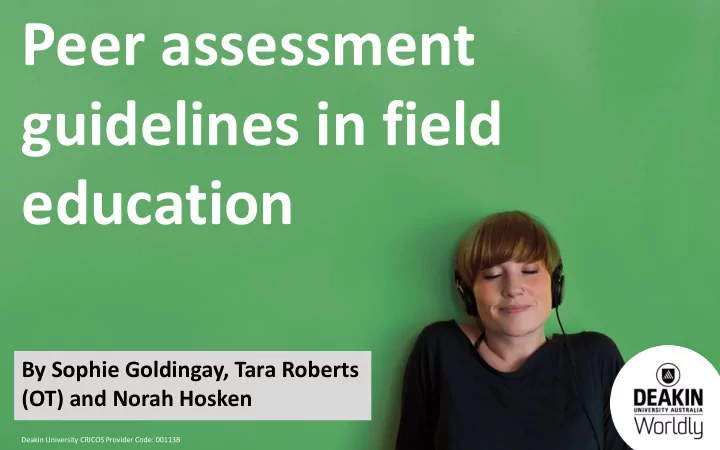

Peer assessment guidelines in field education By Sophie Goldingay, Tara Roberts (OT) and Norah Hosken Deakin University CRICOS Provider Code: 00113B
SOCIAL WORK AND OT – BASED ON PUTTING KNOWLEDGE INTO PRACTICE Deakin University CRICOS Provider Code: 00113B
CURRENT CHALLENGES It is well known that social work field education is undergoing changes due to increasing demands for clinical placements and scarce resources. Deakin University CRICOS Provider Code: 00113B
MEETING THE CHALLENGE Peer assessment -one way to ensure a quality learning experience Deakin University CRICOS Provider Code: 00113B
PEER ASSESSMENT Known effective pedagogy for deep learning Deakin University CRICOS Provider Code: 00113B
BENEFITS IN IDENTIFYING HIGH QUALITY WORK IN OTHERS: • Commensurate with achieving high standards themselves • Key professional skill which promotes lifelong learning. Deakin University CRICOS Provider Code: 00113B
SOME RISKS IN PEER ASSESSMENT: Conflict and competition between students, lack of trust. Deakin University CRICOS Provider Code: 00113B
COMMUNITY OF PRACTICE AIM: Set up positive relationships at the start of the peer assessment work How? • Create space for development of positive relationships • These relationships facilitated to develop shared: • goals • sense of identity • commitment to interacting and learning from each other facilitated within the placement environment Deakin University CRICOS Provider Code: 00113B
One way to develop a community of practice: Set up a charter process which includes a set of questions and activities Deakin University CRICOS Provider Code: 00113B
COMMUNITY OF PRACTICE Example: Prepare a profile of yourself (video, audio or paper) Outline social issues that you are passionate about What attracted you to study social work/OT? Deakin University CRICOS Provider Code: 00113B
COMMUNITY OF PRACTICE CONTINUED: What would you like to get out of your working together? What are your shared goals? What is your usual role when working with others? How can you expand your skills by trying a different role (e.g. If you are usually a follower, could you try a leadership role and vice-versa) Discuss your experience of giving and receiving feedback and working in pairs or groups. What works for you? (ideas developed from Maidment 2009) Deakin University CRICOS Provider Code: 00113B
DEVELOPING YOUR COMMUNITY OF PRACTICE CHARTER Your 'charter' needs to outlines how you will deal with issues that arise. Examples: What to do when you are concerned about performance? What to do about unclear feedback? What rules do you want about punctuality? Deakin University CRICOS Provider Code: 00113B
PRELIMINARY FEEDBACK “ I have noticed in the sessions the students quickly become engaged in the task and enjoy particularly the question regarding the positives and negatives of previous clinical fieldwork feedback in terms of things they like and didn’t like”(OT Student Coordinator) Deakin University CRICOS Provider Code: 00113B
PRELIMINARY FEEDBACK “ In the students’ practice portfolios I had 3 students reflect on the community of practice charter they made together under the SPEF-R section of professional communication - so it seems students are using their own support strategies”. (OT student coordinator) Deakin University CRICOS Provider Code: 00113B
WHERE TO FROM HERE? CONDUCT FORMAL EVALUATION OF THIS TRIAL Deakin University CRICOS Provider Code: 00113B
THANKS FOR YOUR INTEREST IN THIS PROJECT Deakin University CRICOS Provider Code: 00113B
REFERENCES • Boud D, Cohen R, & Sampson J 1999, Peer learning and assessment. Assessment and Evaluation in Higher Education , vol. 24, no. 4, pp. 413-426. doi: 10.1080/0260293990240405 • Boud D & Associates 2010, ‘Assessment 2020: Seven propositions for assessment reform in higher education’. Sydney: Australian Learning and Teaching Council. Retrieved 20 May from http://www.olt.gov.au/resource-student-assessment- learning-and-after-courses-uts-2010 • Falchikov N, & Goldfinch J 2000, ‘Student Peer Assessment in Higher Education: A Meta-Analysis Comparing Peer and Teacher Marks’. Review of Educational Research, vol. 70, no. 3, pp. 287-322. doi: 10.3102/00346543070003287 • Maidment J 2009 ‘Skill based learning’. In J Maidment & R Egan (eds). Practice skills in social work and welfare: More than just common sense. Allen & Unwin, Crows Nest, NSW, pp. 18-34. • Wenger E 2006, Communities of practice: a brief introduction . Retrieved 11 June 2014 from http://wenger- trayner.com/?s=communities+of+practice+a+brief+introduction&x=0&y=0 Deakin University CRICOS Provider Code: 00113B
Recommend
More recommend